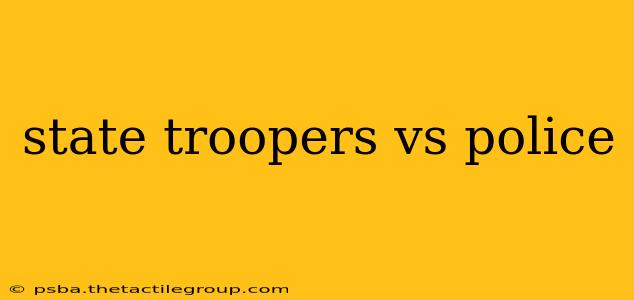The terms "state trooper" and "police officer" are often used interchangeably, leading to confusion about their distinct roles and jurisdictions. While both are law enforcement officers, key differences exist in their authority, responsibilities, and areas of operation. This article will delve into these distinctions, clarifying the roles of state troopers and police officers within the broader landscape of law enforcement.
Jurisdiction: The Defining Difference
The most significant difference lies in jurisdiction. Police officers typically operate within the boundaries of a specific city, county, or municipality. Their authority is limited to that geographic area. State troopers, on the other hand, possess statewide jurisdiction. This means they can enforce laws anywhere within the state's borders. This broader authority allows them to address issues that transcend local jurisdictions, such as interstate crime, highway safety, and large-scale emergencies.
Responsibilities: A Broad Spectrum
While both groups enforce laws, their responsibilities often differ based on their jurisdictional scope. Police officers frequently handle a wider array of calls, including domestic disputes, theft reports, traffic violations within their city limits, and responding to other community-based incidents. They often develop strong relationships with the communities they serve.
State troopers, due to their statewide jurisdiction, often focus on highway patrol, enforcing traffic laws on state highways and interstates. They also play a crucial role in investigations involving serious crimes that cross municipal boundaries. Their duties may also include providing security for state officials and assisting local law enforcement during major incidents or natural disasters. They often have specialized units focusing on areas like criminal investigations, narcotics enforcement, and emergency response.
Specialized Units: A Deeper Dive
Both state troopers and police departments often utilize specialized units. Police departments might have SWAT teams, K-9 units, and detective bureaus. State police agencies similarly have these, often on a larger scale due to their wider operational area. These specialized units provide expertise and resources for handling complex situations beyond the capabilities of individual officers. Examples include:
- Highway Patrol: Primarily a state trooper function.
- Criminal Investigation Divisions: Found in both state police and many larger police departments.
- SWAT (Special Weapons and Tactics): Utilized by both.
- Narcotics Enforcement Units: Found in both.
Training and Qualifications: Similar but Varied
While specific requirements vary by state and agency, both state troopers and police officers undergo rigorous training programs. However, the training may emphasize different aspects. State trooper training often includes extensive driving instruction and specialized training in highway safety and enforcement. Police officer training might place a greater emphasis on community policing and handling a wider array of calls for service within a smaller geographic area.
Conclusion: Partners in Public Safety
State troopers and police officers are essential components of the public safety infrastructure. While their jurisdictions and primary responsibilities may differ, they often collaborate effectively to maintain law and order. Understanding their distinct roles enhances appreciation for the complex system that ensures community safety and security across diverse geographic areas. The distinction isn't about superiority; it's about specialization and optimized use of resources to protect and serve the public effectively.

